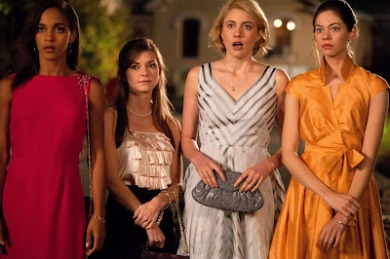Damsels in Distress is a odd little movie. I mean, obviously – it’s a Whit Stillman film. He appears to specialise in quirky little films about the posh and privileged speaking eloquently, showing their little oddities and hypocrisies, and dealing with little moments of lasting consequence.
When Lily (Analeigh Tipton) transfers to Seven Oaks, she is immediately taken under the wing of Violet (Greta Gerwig), Heather (Carrie MacLemore), and Rose (Megalyn Echikunwoke). While living together, they discuss boys – primarily the ‘Romans’ of a nearby frat house and the men Lily seems to get entagled with – and how to live life. Though there is a mock battle, a couple of break-ups, a sanity-restoring bar of soap and even a dance number or two, everything remains resolutely low-key.
The thing is, even though, say, several of the performances are slightly mannered, the way the characters speak is often lofty and unrealistic and even the moments of high comedy appear with quotation marks, none of that feels wrong for the characters in the film. They appear artificial often because they are, attempting to develop deep profundities and life lessons in a way very familiar to anyone who has spent time around a university. The embrace of the superficial as necessary and the necessary as superficial gives the film an odd sensation, but is also startlingly accurate.
The overall result is left appreciating the film for being good, but also with a head-scratching ‘what did I just watch?’ As Violet, Greta Gerwig feels like she’s channeling Chloë Sevigny, playing a young woman of firm, off-kilter beliefs who manages to turn even the polite acceptance of criticism into a compliment. As a slight counter to her distinct performance of an artificial person, Analeigh Tipton’s role as Lily seems to be one of pliant politeness, as her initial role as the new girl who asks questions slides into merely being pleasant. Her reactions drive a lot of the film, and yet she’s not asked to do much.
It’s just an odd duck. Quite charming, and amusing, and the reaction it evoked felt intentional – but perplexing, nonetheless.


